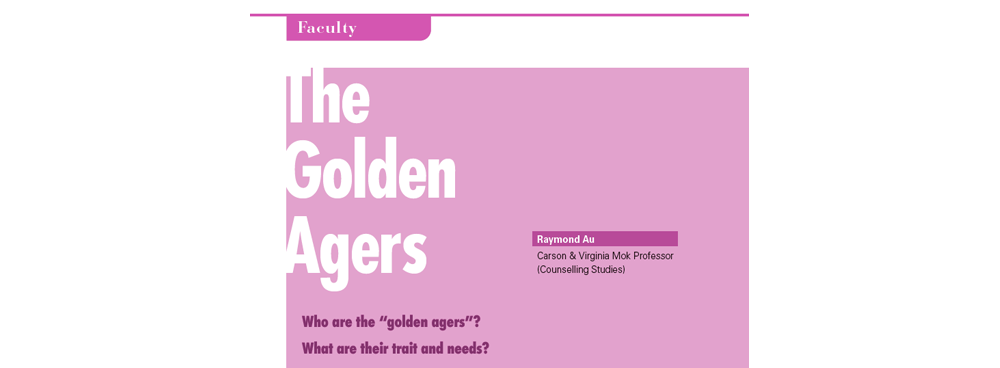
The Golden Agers
Raymond Au
Carson & Virginia Mok Professor (Counselling Studies)
Who are the "golden agers"?
What are their trait and needs?
“Golden agers” refers to those people who is between 50 and 65. They have stepped into the golden age of their lives, often with abundant life experiences. Many of them have much knowledge and skills, with a wide range of interests. They are still in healthy condition, which allows them to have time and space to plan for their life after retirement. If they have achieved financial freedom, they are expected to continue to play to their strengths even after retirement.
Approaching “golden age” can be regarded as the transition period of life. People at this stage gradually step down from their busy working life. They need to say goodbye to their previous life stage. Having gone through a period of disorientation, ideally they can free up time to deal with the regrets of their life, to get in touch with their own feelings, to reorient their purpose of life, and to find out what they are passionate about.
Having engaged in conscientious and hard work for a long period of time, most of the “golden agers” pay attention to their own health, and hope to cultivate the interests which they did not have time to develop in the past. As a result, many personal development plans of “golden agers” are primarily doing exercises, broadening their horizons and nurturing their hobbies. Moreover, many “golden agers” take part in volunteer works, short-term missionary trips, or share their experiences with others. All these reflect that apart from making their own plans, their compassionate heart cares others.
By caring about the needs of the physical, mental, social and spiritual life of golden-age believers, we can help them get used to their retirement life, bring together and fully utilize their gifts, expertise and skills, participate in the church ministry and community service, share their faith and live their life abundantly. In fact, golden-age believers have bountiful experiences in their journey of faith. If they do not want to take up a position in church ministry, they may consider passing on the assets in their own profession and their faith journey to the next generation. They may make an impact on them and become the driving force of “intergenerational mentoring” at church.
Of course, compared with those “goldenage believers” who are rich in resources, there are also people who encounter resistance in their sense of identity when entering their “golden age”. Some still need to work diligently to make the ends meet, not to mention the luxury of developing their personal interests. Others are still worried about taking care of their elderly parents and the “upward social mobility” of their children. They would not have extra resources to join the activities that are too expensive for them. When pastoring the “golden agers”, the church must remember those friends who are living a hard and challenging life. Do not forget or exclude them from the activities. This could be a good opportunity to build up people from different backgrounds, serving one another and sharing the fruitfulness of life.






